with Rob Willson
More stories from the community
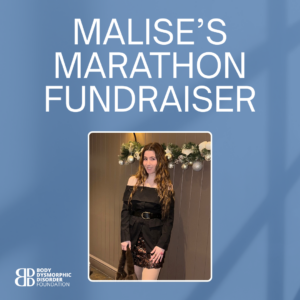
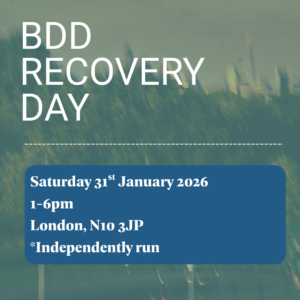
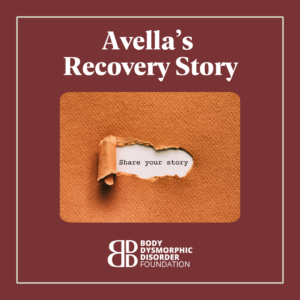

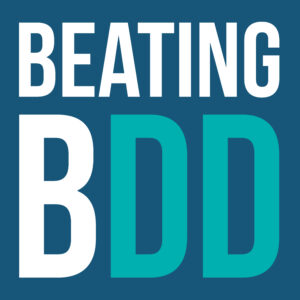
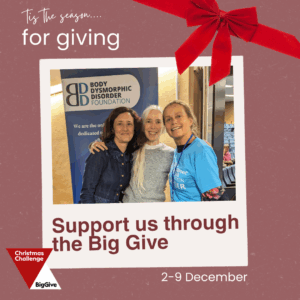
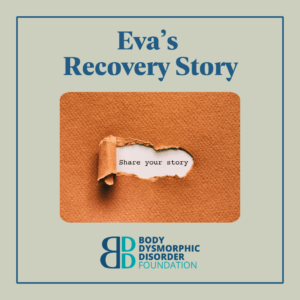
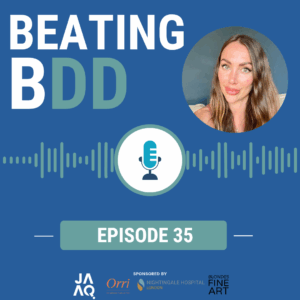


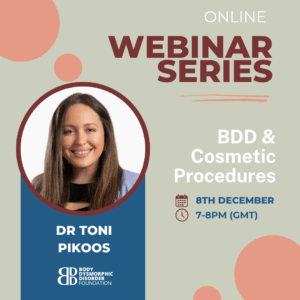

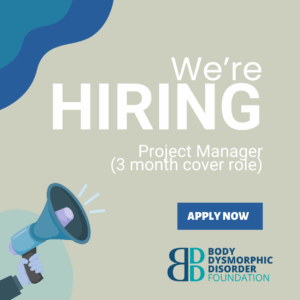














































































As a friend or family member of someone who has BDD you are in a unique and influential position with regards to his or her recovery. However, it is sometimes easy to let yourself become overwhelmed by the stresses and strains of helping someone through what is an extremely difficult period of their lives. Remember that your own health and well-being is as important as your loved one’s. It is critical to his or her recovery that you ensure you can provide the best support that you can. There are steps you can take to aide you in this; help is out there.
“The more you know about the disorder the more effective you can be”
The more you know about the disorder the more effective you can be in dealing with and understanding what it is your loved one is going through. Get to know this site: follow the links, get the books, and read the articles. Aside from the benefits to making your role easier and more effective, people with BDD may at times (for a whole host of reasons) be reluctant to inform themselves, and so it is imperative you do.
With your loved one’s consent, it may be appropriate to arrange a session together with their therapist. The benefits to this are manifold. Keeping the support network for your loved one as consistent and coherent as possible will benefit his or her recovery. In addition, the therapist may be able to open up avenues of support for you, advice on how best to manage the disorder, and above all reassure and help you in your role.
What follows are some personal insights and experiences I have had from living with my partner who is recovering from BDD. I hope this is a helpful tool, amongst the others (given above), to aid the recovery of your loved one.
What is most difficult and at times frustrating to comprehend when encountering this disorder, is how on earth can she be so dramatically concerned about her appearance. How can she think he looks disgusting? She is clearly not.
First of all, I have found it literally impossible to convince her otherwise; this line of reasoning is at best futile and at worst exacerbates the disorder. The simple fact that the way she looks is not causing the disorder. The way you think she looks is most certainly not the cause but most importantly, the way she thinks she looks is not the cause either. The distorted view she has of her appearance is a symptom of the disorder, not a cause. However, her perception of herself is very real to her It is important not to undermine this and the distress that it causes.
While it is important to be clear that you do not agree with her opinion of herself, it is equally important not to be drawn into conversations about her appearance. What I have found invaluable in these situations is to widen the context of the conversation, to focus on why his view of herself is so distorted? On an ongoing basis, it is important to remind her that she is dealing with an anxiety disorder, disguised on the surface by his symptoms and safety behaviours, and especially disguised by what she sees in the mirror.
“Try to be patient and encourage her not to over-indulge in her symptoms”
You should be striving at all times to focus on dealing with the roots of the anxiety: the core beliefs. Try to be patient and encourage her not to over-indulge in her symptoms and safety behaviours. It is very beneficial and important to acknowledge and encourage the commitment and courage it takes for her to begin talking about and overcoming her BDD. When my partner began to be able to verbalise her anxiety to a wider network of friends and colleagues, much of the embarrassment and secretiveness that held the disorder in place was dispelled. People tended to be extremely understanding and supportive. This made the sometimes-claustrophobic nature of being her sole confidant, on such an overwhelming matter, lighter on both of us.
It is vital that this is not done on her behalf, and equally that she not be coerced into to sharing her problem, as this will serve only to compound the embarrassment and anxiety holding much of the disorder in place. Reflecting on the period before my partner’s diagnosis of BDD with that of the period after her diagnosis and the subsequent professional help she received, it is astounding how much she has achieved. Much of what is written above (for purposes of clarity) seems to show a smooth arc from diagnosis to recovery. I feel it necessary to assure you that the experience was nothing of the sort, and still is not. It remains an experience of struggle and confusion as to what exactly BDD is and how best to tackle it. What is, I hope, clearly outlined, is a summary of how I (and many others) have been able to support her onto the road to recovery. This recovery has proved very real and dramatic since she began receiving cognitive behavioural therapy and challenging directly what lies beneath her feelings of disgust at her appearance.
“BDD desperately wants to keep itself in place”
I cannot stress enough how important this first difficult step – of actively seeking help from professionals – was for her. What is important to remember is that BDD desperately wants to keep itself in place; it created in my partner a vicious circle of embarrassment, shame and secretiveness that made talking about it literally unbearable for her. It is, however, this process of communicating that has been the most successful tool in tackling the disorder, and the most effective support I have been able to provide.













My brother Martin Joseph McAnulty was 22 when he committed suicide on the 24th November 2010. At the time he passed, neither Martin nor his family had heard of the debilitating condition called Body Dysmorphic Disorder. But those of us who loved him sought an explanation for his suicide, and the note he left us, from a psychiatrist. And so my experience of this condition comes not from living with someone diagnosed with it, but from grieving and trying to understand my brother after he had passed.
“It’s hard to imagine that someone so apparently outgoing could be suffering from such a condition”
Martin was an intelligent, normal ‘lad’ who participated in activities typical of any boy his age, such as going out with his mates, playing football, supporting a football team (Tottenham) and spending time with his family. He studied Creative Writing and Journalism at St Mary’s University, and was involved with the university newspaper. It’s hard to imagine that someone so apparently outgoing could be suffering from such a condition. But after he passed we realised that he had been suffering alone, and in secret.
On the night he died Martin came home to see my mum, dad and sister. I was living at university, so missed seeing him that final time. They thought it was unexpected that he had come home from university. But he explained that he was going to visit a friend, and so thought he would pop in and say hello. Martin spent time with my mum, dad and sister separately. Looking back they can see that he acted in a way that was unlike him. He declined the radiator key my dad had offered him for his uni house, despite needing it, and asked our mum if she was proud of him. Then, instead of visiting a friend like he said, Martin went to a nearby field and sadly killed himself. It was a passerby that noticed Martin and called the police.
Once he was identified the police came to our house and informed my mum that Martin had died. His family was called home, where we were told what had happened. The police gave us a letter written on Martin’s laptop that they had printed off for us to read.
‘The reasons for doing this are because I cannot live with my scarred nose anymore. I have tried oils, creams and anything else I can put on it. The condition of my nose is progressively worse at time of writing; skin is peeling off and it hurts when I move it the slightest bit. I cannot shower properly as my nose ends up in excruciating pain and whenever water or sweat goes on my nose, more skin peels off.
‘When I was looking in the mirror all the time it was not because I was vain, but scared. I was worried and petrified at the state of my nose. Whenever I asked for help I hit a brick wall. I was told “don’t be silly I can’t see anything”, or “stop being vain stop looking in the mirror”. No-one offered me real honest advice, maybe out of politeness, but it didn’t help.
‘I’ve had enough of fighting and battling my issues, instead of ‘manning up’, I’m giving up. I’m a beaten, broken man, in the words of Shawshank redemption, “Get busy living or Get busy dying.” I’ve chosen to do the latter.’
“At this point none of us could understand how he could have done something so awful over something we felt to be insignificant and non-existent”
This was a portion of what Martin wrote in his final letter. He also wrote of the love he felt for his family. At this point none of us could understand how he could have done something so awful over something we felt to be insignificant and non-existent. It was only when my auntie Elizabeth, who worked in health care for many years, did some research into the symptoms Martin describes above and other feelings he wrote of in the letter that she came up with an answer. We contacted Dr David Veale, a psychiatrist with expertise in BDD. He agreed that Martin had been suffering from the condition. In some ways my aunt gave us a gift: we might not have closure on the fact of his death, but we have an answer to the question of why he felt he had no choice but to die.
Nevertheless, the pain we feel individually and as a family is one that is difficult for me to describe. We are completely heartbroken and helpless. I sometimes try to put myself in his shoes and understand the suffering he went through alone, but it is impossible, as I can’t experience what he felt. Looking back, Martin had shown signs of body dysmorphia. But they were so intermittent, and so secretive, that it was impossible for us to see what was wrong. He did things such as shaving the top of his eyebrows when he was 14, asking me to apply makeup to his spots, and staring in the mirror for long periods of time.
It has been hard to come to terms with the fact that he died from a condition we’d never heard of, and at times my mum feels unsure he did die from it, since it was never diagnosed. But this is like saying the thousands of men who have died from undiagnosed prostate cancer didn’t really die from it. Martin went to the GP to ask for help with his nose before he passed away. He was given steroid cream, but of course this wasn’t what he needed. I don’t blame the GP for not knowing that Martin had been suffering mentally, because I don’t think he knew either.
With support from our amazing family, supportive friends and counselling, we started our journey towards understanding his death and the way in which Body Dysmorphia affected him. Martin made his choice, and none of us could have prevented what he did. I do believe that if he had got the answer he so desperately needed – a diagnosis – then maybe I wouldn’t be writing this testimonial about him now. My hope is that through raising awareness about this condition, hopefully others will find their answer. I believe that if Martin’s experience helps to save others, then his death wasn’t in vain.













It was Thursday morning, 12 March 2015, when my father told me that David wasn’t breathing on his own. Half-asleep, I assumed the staff at the hospital had placed him onto some sort of life-support machine. In a way, I was actually relieved. David had been in a psychiatric ward after being rescued from the edge of Beachy Head by the Chaplaincy Team that patrols the area. Since being admitted into the hospital, he’d been talking about how much he regretted not jumping, and how he’d find a way to end his life there instead. My immediate reaction to my father’s news was that that would be impossible (even for him) if he was on some sort of machine, and so despite the seriousness of the situation, and how terrible it was that it had come to this, I was relieved – almost glad. I thought this would be both the lowest point and a turning point. It couldn’t get any more extreme than this; he’d be shocked into taking positive steps to get better. It would force him to.
“My feelings towards him had crystallised, and were finally clear to me, only now at the exact moment when it was too late to tell him.”
A few minutes later, my father came back to tell me that he was dead. I remember asking him a stupid question about whether they’d phoned us or he’d phoned them. It seemed important to find out, since there must’ve been a miscommunication: my brother wasn’t dead. And in those first few seconds of denial, there was a sudden realisation too, as if all my feelings towards him had crystallised, and were finally clear to me, only now at the exact moment when it was too late to tell him.
Looking back at his life, my brother had undiagnosed autism and Asperger syndrome for as long as I can remember, but the first time David showed signs of BDD was when he faxed home drawings of himself while he was studying in Rome as part of his degree. At school he’d been bullied about how he looked (he’d been bullied about a lot of things) but this was the first time he began to publicly obsess over and express shame about aspects of his appearance. He went on to finish his studies at Cambridge (Medieval and Modern Languages, and Philosophy) and graduated with a scholarship, but he was already battling severe depression. There were many occasions over the years when he’d tell me he wished he’d never left academia – not because of the social side of university life (he actually said he regretted trying to focus on that side of things) – but because studying was one of the few things – perhaps the only thing – that he truly wanted to dedicate his life to, that he could feel a real sense of achievement with. For people like David, whose minds are ever restless, always inquisitive, I think academics is one of the few things that brings them a semblance of peace.
“David’s BDD would eat away at him for the rest of his life. It would consume him; eventually it was nearly all he could think or talk about.”
He left university, but after a couple of jobs that didn’t work out, David’s mental health issues prevented him from working and having any kind of career. He had ongoing depression, but the next time BDD surfaced again was probably about ten years ago when he started to fixate on what he considered to be unacceptable hair loss. He had a successful hair transplant – but not long afterwards he began to talk continually about other perceived flaws: his nose, his jawline, his forehead, the asymmetry (as he saw it) of his face . . . in all likelihood the seeds of being bullied as a child had finally started to take root; certainly the crippling insecurities had been pushed to the forefront of his mind. Combined with his autism, Asperger syndrome and depression, David’s BDD would eat away at him for the rest of his life. It would consume him; eventually it was nearly all he could think or talk about.
It’s a testament however to his character and generosity of spirit that in spite of the scale of his suffering, David was dedicated to helping others through his work as a trustee of the Body Dysmorphic Disorder Foundation. A jack of all trades and master of them all, he was at home helping out on the IT side of things as he was drafting eloquent introductions to how BDD shaped Kafka’s writing. David was passionately committed to advancing understanding of the disorder and raising the level of support available to sufferers. He was immensely proud of how much the Foundation has accomplished in such a short space of time. If only he could be here as it continues to grow and thrive.
“With David on your side, you really felt like anything was possible”
Those lucky enough to have got close to David will never forget him. He lives on in our memories, and in the inspiration and determination he continues to give us. His friends and family lost a unique intellect and an extraordinary person – with David on your side, you really felt like anything was possible, that any problems could be overcome, that any goals could be achieved.
“BDD sufferers know they need you; let them know how much you need them too.”
I can only guess at the level of suffering those affected by BDD go through, but I wish those who take their own lives because of it could see the effect that suicide has on their families and all those who care about them. I wonder if they could see how much it tears lives apart, then despite all their pain, maybe they wouldn’t go through with it. If you have BDD, please, please do all you can to keep fighting, to make use of the network of support that charities like the Body Dysmorphic Disorder Foundation are doing so much to promote and develop. And if you’re close to someone who has BDD, keep doing all you can to help. And always let them know how much you care about them. BDD sufferers know they need you; let them know how much you need them too. Along with how much I loved him, I think that was what I realised at that moment my father told me David was gone.













My first memory of BDD symptoms was when I was out shopping with my Mum and I noticed people looking at me as they walked past. I remember telling my Mum constantly that, “Everyone is staring at me” and I wanted to leave. This happened every time I was in large social settings and it became a huge effort to go out. My Mum would always tell me that it was possible they were admiring me or my outfit and that everyone who meets me tells her how beautiful I am. These were comments I constantly brushed off as classic ‘Mum talk’.
I don’t remember a time when I ever felt content or happy about my body and appearance. During my High School years, I was bullied about my weight, my appearance and, later, my intellect. Comments were made like: “No amount of makeup will fix your ugly face”; “It’s actually disgusting how fat she is”; “She’s so dumb she actually doesn’t deserve to be here” and jokes about me doing further Maths. These were, unfortunately, things I heard daily. Those comments, on top of the pressures every normal teenager faces, were enough to cause me to enter a very damaging spiral.
“I would go home and try to find ways that I could look more like them because, in my mind, they looked so much better than me.”
My focus completely shifted to my physical appearance because that seemed to be everyone else’s focus on me. I began purging. I thought if I lost heaps of weight, I wouldn’t get bullied anymore and I would be happy and skinny like everyone else. That was my mentality and I stuck to it for a very long time. One of my best traits is that I’m extremely self-motivated and one of the my worst is that I can be extremely stubborn – if I want to do something, I’ll do it and I’ll do it until I’ve pushed myself to my absolute limit. I lasted about a month or two of skipping lunches at school and heading to the bathroom after dinner before I realised that nothing had changed; I was physically and emotionally wrecked. I then looked for the next fix and began to spend hours every single night Googling ways to lose weight fast including diets, pills, surgeries… anything I could find. I would spend hours looking at myself in the mirror thinking of things I could get done and changes I could make from head to toe. At school, I was constantly jealous of other girls and friends of mine, which caused me to become incredibly introverted. I would go home and try to find ways that I could look more like them because, in my mind, they looked so much better than me.
University came around and that brought on a slew of more insecurities. These insecurities were in the form of dating, boys and social gatherings. Social situations were always very difficult for me. I was very good at putting on a front and saving face (a bit too good) and going from the dancefloor, into a taxi, then into bed and crying myself to sleep; this became an all-too-familiar weekend routine. Pool parties, beach days, and beach houses were a no-go zone for me and even the clothes I wore became incredibly limited. This was all so I didn’t risk friends looking at me and thinking I was fat.
“My preparation was extreme dieting and exercising and a mirror analysis most nights”
When beach days or pool parties came around I would always go into a panic. I hated events that weren’t planned weeks in advance because I needed time to prepare. My preparation was extreme dieting and exercising and a mirror analysis most nights. One of the biggest turning points for me was a friend’s birthday party in Cape Schanck. It was a Hawaiian themed party and everyone was going, including the guy I liked. I got the invite weeks in advance and started preparing my diet and exercise routine. I exercised for 1-2 hours a day and ate very few calories every day, often causing me to feel faint or to pass out mid-workout. For the first time ever, I felt like I could go to the event, be in a bikini and look somewhat okay next to everyone else. It was a huge deal for me to reach that point and I worked myself to the bone those two weeks for it. The night before I had my best friend’s 21st birthday and we were all leaving in the morning, so I had my bags pre-packed. I was doing my makeup when I got hit with the comment, “Exercises every day and still looks that fat”. After weeks of putting myself through hell, that broke me. I wiped away my tears, finished my makeup and went to the 21st with a happy face on and pretended that work had called me in to cover shifts and I couldn’t come to the weekend away anymore. The reality was that I spent that whole weekend in bed crying. I was looking at photos of my friends having fun, becoming extremely jealous of their mentality, pretending I was at work and then crying. I never knew what it felt like to just be able to go to someone’s beach house on a whim and to have fun and I had come so close to experiencing that. I think I out-cried myself that weekend. Two days later I promised myself I would never allow myself to feel like that ever again.
Dating was a whole other situation. I always went in pretty confident with dating until it got to the intimate point and I would freak out. I thought that once they saw my body they would think, ‘Woah, she’s actually so fat and ugly’, which caused me to often try to leave my clothes on during sex. I wanted so badly to be confident and to express myself but I had been scared into not exposing my body and I couldn’t shake it off with anyone. Add one extremely toxic situation with a guy for five-six years into the mix and the spiral just got deeper. I started studying and comparing other girls he liked as though it was my job. Every single girl was a supermodel in my eyes and I got uglier and uglier with each comparison of each girl. I didn’t realise how bad it had become until mid-argument when this ex had to tell me to, “Stand up for yourself”. Things took an interesting turn when I began to get consistently slut-shamed. I had one ‘friend’ tell me that I “get around a lot” quite recently and that I “have nothing important to say” while another made a tree of people in our group who had hooked up and placed me in the centre, accompanied with judgmental comments and gossiping. Being slut-shamed by people I thought were my friends made me see myself as an object. I believe you are treated the way you allow others to treat you and I began to allow a lot of people to treat me like an object; I went along with a lot that I wasn’t okay with at the time.
“I had days when I really liked the way I looked but when you hear something enough you start to believe it.”
Although I always thought I was uglier than the average person and felt incredibly damaged from other people’s perceptions of me, I never wanted to change my physical appearance. I had days when I really liked the way I looked but when you hear something enough you start to believe it. I began to see everything I saw in the mirror in a negative light and assumed the role of someone that had zero self-esteem. That was the biggest mind twist for me. My mind shifted into being unhappy with myself because of other people, when in reality I feel like I’m the strongest and most confident person I know. Confidence to me has never been about being loud or being the centre of attention; it’s about being sure of who you are, your intentions, believing in yourself and backing that. I always knew deep down that I had something to offer and was going to get through the bullying and BDD and come out of it much stronger.
I haven’t got over BDD. I don’t think it never really goes away. I go through phases when I’m booking surgical consultations and cancelling them the next day and phases when I’m over-exercising and being too hard on myself. But then I go through phases when I’m wearing clothing that I never had the guts to wear before and feeling myself. Just the other day I was shopping with friends and as we were discussing what sizes we would be. The sales assistant came up to me and said, “You’re definitely an extra small, you’re tiny”. While many people might find that complimentary, I was about to reach for the medium size and was very taken aback that she looked at me and saw me as an extra small and labelled me as tiny. I became extremely nervous about trying the clothing on because I knew it wouldn’t fit me in the slightest. In actual fact, it was probably a bit too big and I had a moment in which I had to shift my mindset to be a bit kinder to myself.
I feel extremely proud of where I’m at today but it wasn’t easy and has taken me years of self-work and a shifting of priorities to get to the more relaxed mindset about physical appearance I have now. I skipped a lot of social events that made me uncomfortable. I don’t subscribe to influencers or brands that flaunt unrealistic bikini bodies on social media. I completely cut negative people who evaluate success as having an amazing job, boyfriend and being skinny from my circle. I have come to just focus on being single and finding my own limits and happiness without being influenced. The biggest thing I’ve learnt is just to be kind. You never know what people are going through; some people are just more vocal than others. Still, to this day, there are friends and people I’ve dated that would read this and have no idea I even remotely felt this way about myself or was going through BDD. I’ve also learned a hard lesson that – you are who you surround yourself with. The way you feel about life, yourself, your future is completely influenced by your conversations and experiences and, therefore, it’s so important to be around people who push the good sides of you. I’m extremely lucky to have a strong and supportive family and friendship base but I never take that for granted and I work to maintain those bond constantly.
Today, I live a very healthy lifestyle but I do that because I grew up in a healthy and active household. I have two doctor parents and was raised to take care of myself; not in order to look skinnier, but in order to live a stress-free life. I can genuinely say that I feel really grateful for my appearance and body. I feel more confident in myself than I ever have and I don’t let BDD dictate what I do or don’t do anymore. At the risk of sounding cliché, life really is too short to watch everyone else enjoy themselves. Oh and I also swam in that Cape Schanck pool for the first time a few months ago with no worries and it felt damn good!












